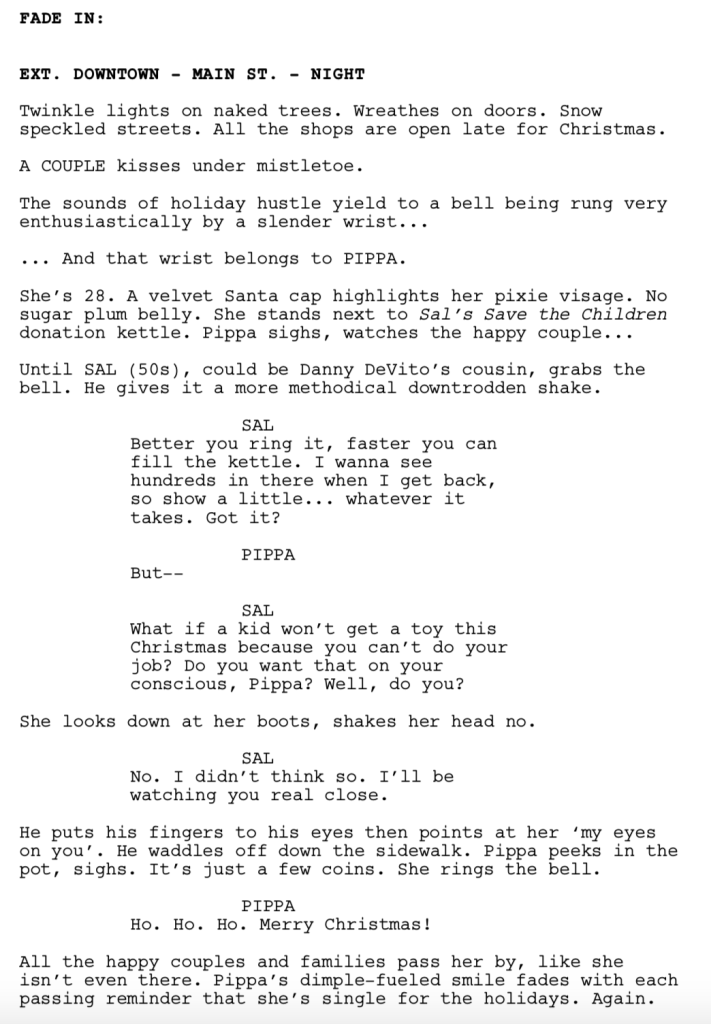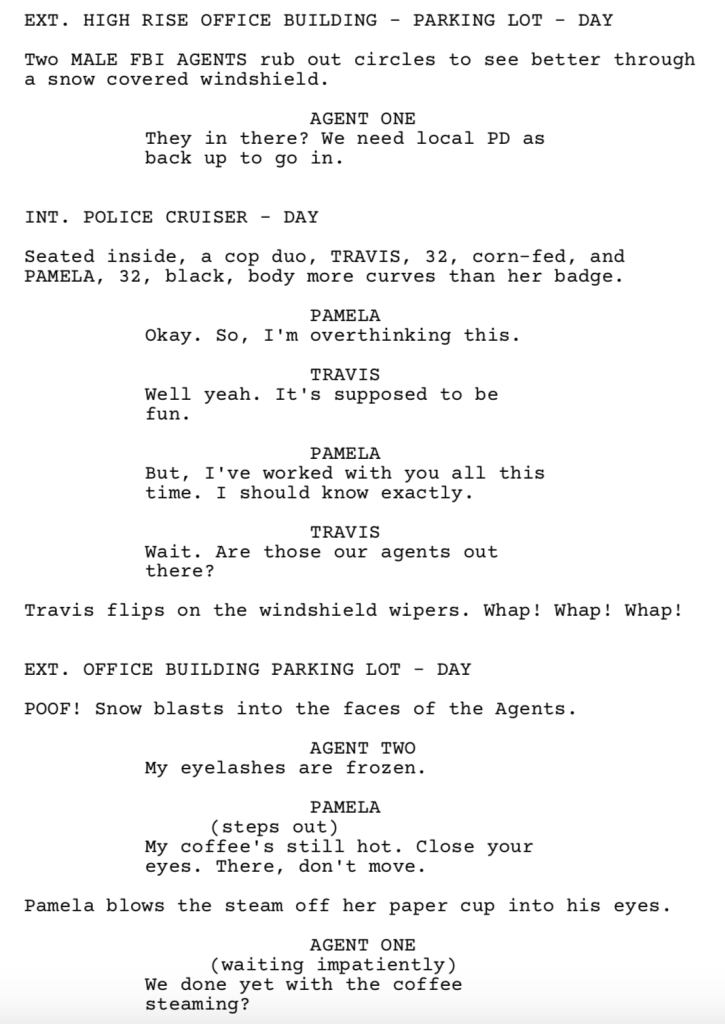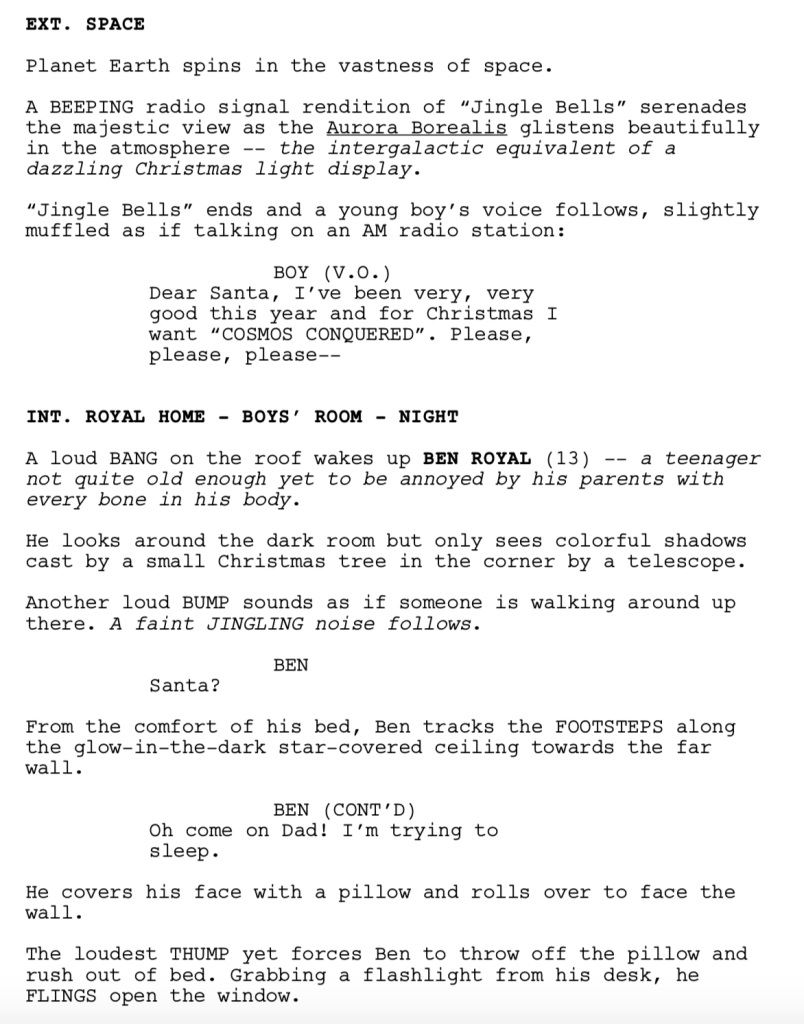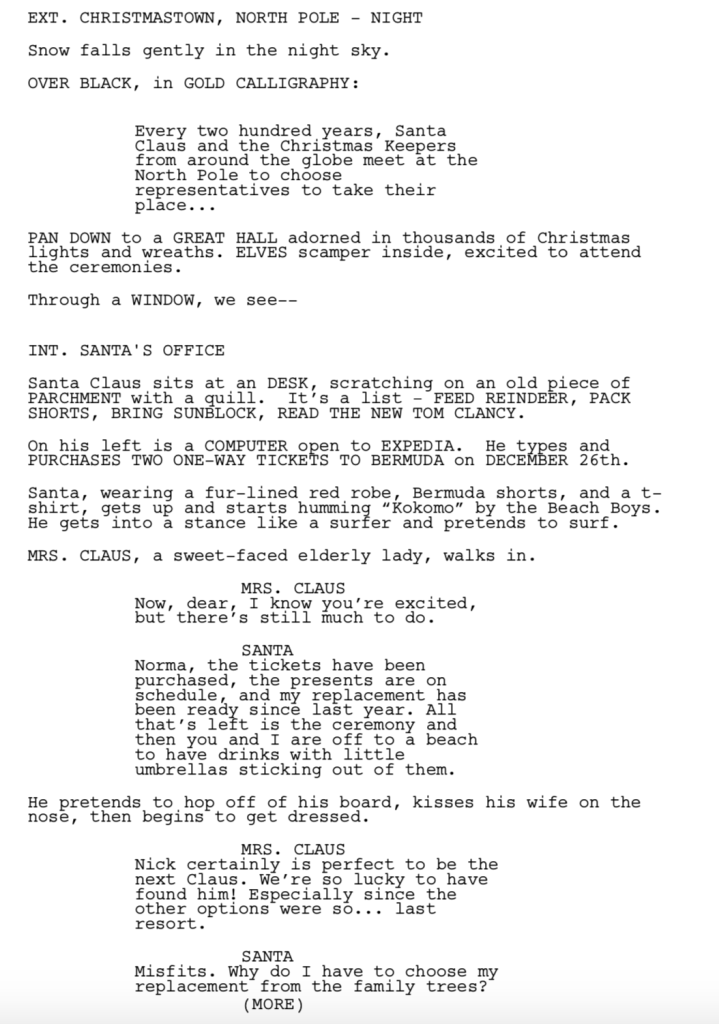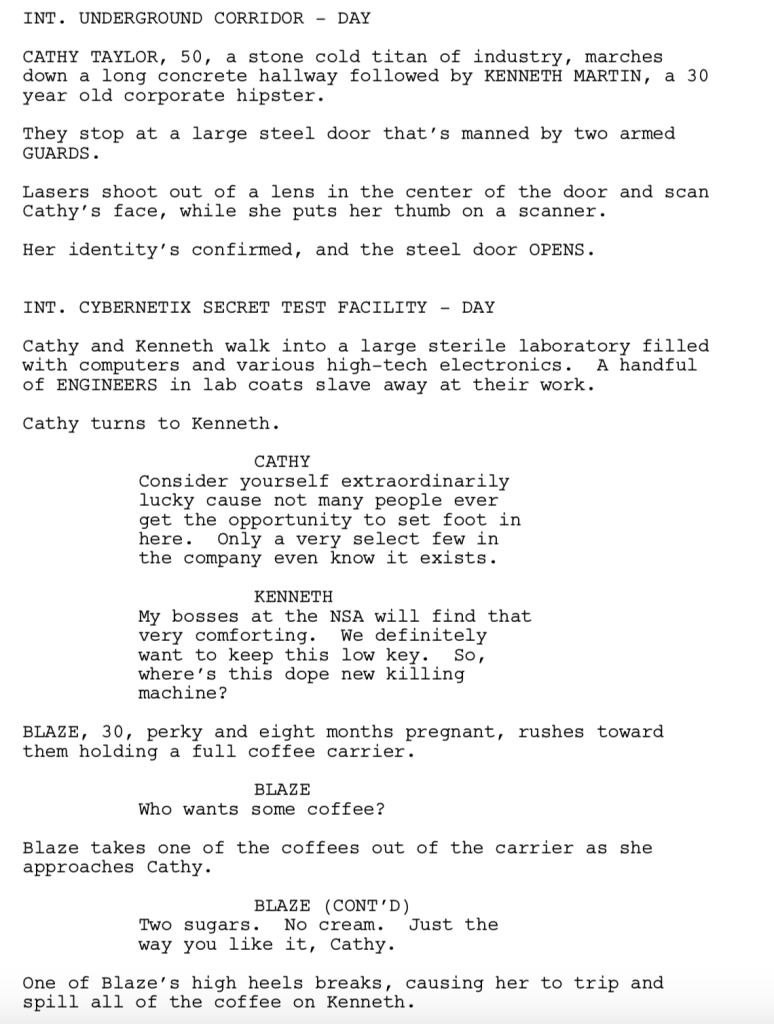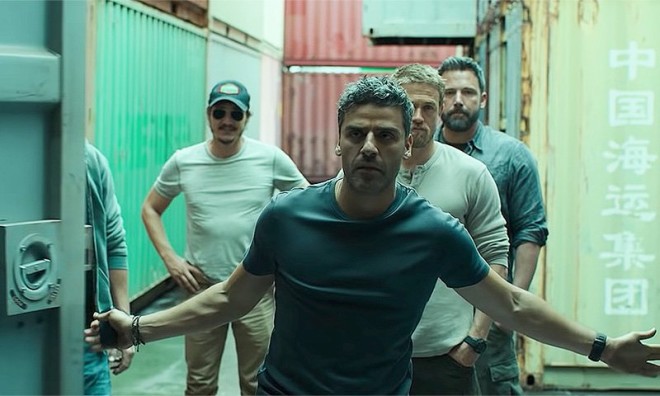Genre: Thriller/Contained Horror/Drama
Premise: When renowned interventionist Warren Man’s daughter, Christy, suffers a relapse and her family is forced to deal with their inner demons at the site of a tragedy that tore them apart, it slowly becomes clear that this is no ordinary relapse, but something much more sinister.
About: This script made this year’s Black List, an annual list of the best screenplays of the year, with 7 votes. I normally wouldn’t review a script this low on the list so early. But I saw a few of you talking about it in the comments section and was intrigued. The script is being produced by Hopscotch Pictures. This appears to be the writer’s breakthrough screenplay.
Writer: Colin Bannon
Details: 91 pages
I used to watch Intervention, aka one of the most frustrating shows ever produced. You’d meet someone who was addicted to drugs, watch their horrifying daily routine where they did everything in their power to find their next high. You’d see these helpless parents and family members who couldn’t do anything to stop them. Many of them would actually pay for their daughter’s drugs because they knew if they didn’t, they would go prostitute themselves to pay for them. You’d finally go through this incredibly emotional intervention where everyone tells the addict how much they love them.
The addict would then accept help to go to a rehab facility. Then, after all of that, they’d give you a 5 second closing title card updating you on what happened. Most of them would read something like this: “Amy lasted three days in rehab before they caught her sneaking in dope. She was kicked out and now lives on the streets. Her family hasn’t seen her in months and fear that she might be dead.” There are only so many episodes of that you can take before you say, “NO THANKS!” So I quit Intervention.
However, this leads us to our first screenwriting tip of the day. I love the idea of taking popular reality TV shows, or reality docudramas, and looking for a feature film spin on them. You can always do that with horror, which is what our writer did today. You could do the same with Hoarders (has anyone done a hoarder horror movie yet?) or that Bear Grills show, where he takes regular people out in the middle of nowhere and tries to survive. What if you wrote a movie where the Bear Grills character died early on and the hero had to survive all by himself? This is just off the top of my head. I’m sure there are tons of other shows you could do this for.
But as we always say here on Scriptshadow, coming up with the idea is only half the battle. The other half is doing something with it. Let’s see if this Black List newcomer was able to intervene himself to an impressive execution.
50-something Warren is one of the best interventionists in the world, due in part to the enormous success of his book, “The Interventionist: A Story of Addiction and Redemption.” That’s right. Part of the reason Warren is so good at his job is that he used to be an addict himself.
Despite his career success, Warren’s a big fat failure in the family department. He and his wife, Marie, divorced a long time ago. And his adult daughter, Christy, is a hardcore heroin addict. When Marie comes back into Warren’s life to ask him to save their daughter, the decision is both easy and difficult. Of course he wants to save his daughter. There’s only one problem – she hates him.
Marie picks Warren up and brings him up to their old lake house, where the intervention will take place. Christy’s boyfriend is bringing her up here under the guise of spending a romantic weekend together. Joining the pack is Richard, Marie’s perfect new husband.
When Christy finally shows up, she’s furious at being tricked. And while everyone tries to get the intervention started, slices of the past are injected into the proceedings that add context to their situation. It turns out Warren’s negligence led to Christy’s little sister drowning when she was four years old – a big reason why Christy has turned to a life of drugs. But as the intervention continues, we realize just how deep the negligence goes. Maybe the interventionist wasn’t as clean, at the time, as he’d led everyone to believe. Until he can admit that to himself, Christy will never find peace.
There are a lot of good things about this script.
I love the setting. Place your characters in a house in the middle of nowhere and you’ve got yourself a movie that can be made. That’s huge. So many of the decisions that color how someone reads your script revolve around, “Can this be made?” If you can come up with a NEW HOOK (not an old one!) that utilizes this setup, your script is going to have an advantage over tons of other more expensive screenplays, even if those scripts are better than yours.
And I like that there’s a clear objective with this concept. We’re going to this house TO GET A JOB DONE. It’s not like all of these weak movies where a group of teenagers drive out to a remote house then horror shenanigans begin. This setup is structured. And when you have that structure built into your concept, the chances of you writing a good screenplay increase dramatically.
I also like how much emphasis Bannon puts on the characters and the relationships. This movie is all about character development and conflict resolution, which ensures that it’s going to connect more deeply with the audience. And it should be noted that this is INHERENT in the concept. If you write a movie about intervention and drug addiction, you’re organically going to be be exploring characters.
All of this makes it frustrating that the script doesn’t deliver on its premise. And it’s a classic screenwriting problem that occurs with this specific setup. After the first 45 minutes of these contained setting stories, the writer starts feeling boxed in and resorts to gimmicks, scary imagery and reality-questioning (What’s real?? What isn’t??). These things are fine in small doses. But when you start depending on them every other page, you’re pressing. Whenever I encounter this, I can tell the writer is losing confidence in his story.
The breaking point for me was when Warren successfully convinced Christy to go to rehab. They drive out that very moment (to a rehab that’s, what, 1000 miles away??), Christy turns into a psycho zombie and steers the car into a lake, Warren almost drowns, survives, walks back to the house, and we continue the intervention like nothing happened, then two pages later Christy is levitating in the air.
I’m like, “Okay, that’s it. I’m out.” It was too much.
And I know that there were reasons for these things happening (Christy was, essentially, being possessed by her dead sister at this point). But even that didn’t make complete sense. I mean, your daughter is floating in the middle of the room and everybody’s focused on continuing the intervention? At that point I’m thinking the objective has changed.
This became the big issue with the end of the movie, as it got messier and messier. While there’s an argument to be made that you want things to get crazier as we move towards our climax, there has to be some structure to it. Like with The Exorcist. There was some crazy-ass shit going on there at the end. But we were never confused about what was going on or what the priest needed to do to succeed. Whereas here, there was more of an “anything goes” mentality. And that’s too bad because, like I said, there’s a lot here to celebrate.
A big pet peeve of mine is messiness. Once I sense things getting too messy, I check out. And, unfortunately, that was the case here. At least for me. What did you think?
[ ] What the hell did I just read?
[x] wasn’t for me
[ ] worth the read
[ ] impressive
[ ] genius
What I learned: This is a great example of building a story around an ironic main character. Irony in your main character almost always works. Warren is an interventionist who’s a drug addict.
Genre: Biopic
Premise: While a student at Stanford University, Evan Spiegel creates the American multinational technology and social media company Snapchat.
About: This is the number 1 script on the 2018 Black List, which was released yesterday. The writer, Elissa Karasik attended Stansford, and would later work as an assistant to two showrunners, on both Backstrom and Bones (according to The Hit List, which had Frat Boy Genius as its number 13 script).
Writer: Elissa Karasik
Details: 116 pages
The Black List is here and already the complaining has begun! I know the Black List has its issues, but Barky put up a great comment yesterday and I echo everything he had to say in it: “I hate to say it, but most who complain about the quality of the scripts in these lists just have sour grapes. Generally, if you spend any time reading the scripts, it’s pretty easy to tell why there was interest in them. No script is perfect, but there is always SOMETHING, be it concept, voice, character work, etc, that stands out in these scripts. I guarantee you, no matter whose script is up there, someone is going to say it doesn’t deserve to be there. Instead of griping and tearing these scripts down, we should be asking ourselves what it might have been that got interest in the first place, and how we can add such elements to our own scripts.” Well put!
So what are my thoughts on this year’s scripts? For starters, I’m ecstatic that Michael Voyer made the Top 10 with The Broodmare. It wasn’t long ago he wrote me an e-mail confessing he was thinking about giving up. Just goes to show, you gotta keep at it. Normally, I would turn my nose up at the number 2 script, King Richard, as it is yet another member of the tiresome genre known as the biopic. However, a lot of you know my previous life was tennis-centric and Richard Williams was one of the strangest, most controversial figures in tennis for a long time. I’m interested to see if the writer can bring us anything new about him.
Harry’s All Night Hamburgers is a great title and since it’s science-fiction, I’ll definitely check it out. Of course Get Home Safe is in the top 3. The script and its 2-page (or 100 page, depending on how you look at it) FU to white males may have turned a lot of people in the industry off. But the important thing is that it GOT PEOPLE TALKING IN THE FIRST PLACE. It’s hard to stand out when all you have is paper and ink, and Christy Hall figured out how to do it. I’m shocked Cobweb is ranked so high. It’s a very average script. It reads fast, though.
“In Retrospect” reminds me of the old days with its mind-bending high concept. I always felt that like-minded “The Cell” could’ve been a great movie. They didn’t do enough rewrites on the script though. This concept (going into other people’s minds to get something done) is still there for the taking. I feel bad for perennial Black Lister, Gary Spinelli. His script, Rub & Tug was on the fast track to getting made before the trans community shamed Scarlett Johansson for daring to portray them. That baffling play has ensured the movie will never be made (or, if it does, the budget will be 1 million and no one will see it). Not sure what the endgame was there.
Queens of the Stoned Age sounds decent at best, but Elyse Hollander has ensured I’ll read anything of hers after Blonde Ambition. A Vanilla Ice biopic might be too much for me to handle. Unless I light up a stage and wax a chump like a candle. The Fastest Game sounds interesting. I like when writers find a new angle into old subject matter. I’ve heard of gambling before. But I’ve never heard of the sport “Jai Alai.” I want to know more. There was another script about Bob Ross a few years back. This one, Happy Little Trees, with its conflict-heavy logline, sounds a lot better. A logline without conflict is like a burger without fries.
Good to see The Beast made the list as it proves The Black List can still have fun. “Dark” sounds cool. Oil rigs and creatures hidden away for hundreds of years? Count me in. Kill the Leopard has the single most confusing logline I’ve ever read in my life. There may be 17 movies going on in that sucker. “Mamba” is one to keep an eye on. Kobe’s sexual assault case came during a time when that sort of thing could be buried. If it resurfaces as a “thing” in this era, especially with Bryant moving into movie production himself, it could get ugly.
It’s EXCELLENT to see Nicholas Mariani back on the Black List. The Defender doesn’t sound like my cup of tea. But if it’s from Mariani, I’ll read it. For those who don’t know, Mariani wrote the number 1 script on my Scriptshadow Top 25 list, Desperate Hours. I don’t know if I’m reading this right. But I’m pretty sure there’s a thriller on the list about a rabbit. Former Black List topper Graham Moore is back with a new script. His last project about Tesla got buried due to a similar project. Good to see him back in the saddle.
I find it baffling that every year on the Black List, there are two scripts with similar concepts that end up suspiciously close to each other in the vote tally. This year we have both The Second Life of Ben Haskins and The 29th Accident, both about dead partners who come back to life. There’s got to be a glitch in the voting process due to how often this happens.
Inhuman Nature sounds like a comedy set up but I think it’s being sold as serious? Nobody Nothing Nowhere sounds like one of those trippy ideas that could be either really good… or really bad. Wendi sounds okay. I didn’t know that Murdoch’s second wife came from the slums of China.
So, yeah, there’s a lot of good reading ahead. And, no doubt, there will also be some surprises. If you read anything on the list before me, please share your thoughts in the comments section. I’d rather go off recommendations from people I know than randoms. In the meantime, let’s check out the number 1 script on the list!!!
Evan Spiegel, as our title implies, is a frat boy. He is not, however, a genius. At least according to our story’s narrator, Lily, who uses the majority of her voice-overing to paint Evan as an entitled douchebag idiot. But let’s not get ahead of ourselves. One day in college Evan hears a student discussing accidentally sending an embarrassing photo to his mom, which gives him the idea for Snapchat (then titled Picaboo). Snapchat deletes photos several seconds after they’re sent.
Evan teams up with his two best pals, Bobby (who handles coding), and Reggie (who handles day to day operations) and moves to California where they desperately try and get their app off the ground, all while Lily offers her unfiltered thoughts on how dumb Evan is. Eventually, Evan realizes he should be targeting high school kids, and that’s when his app blows up. One of those kids ends up being the daughter of Michael Lynton, then CEO of Sony Entertainment. Michael gives Evan the money to take Snapchat into the stratosphere, and that’s exactly where it goes. The app is worth 13 billion dollars within a couple of years.
Despite it being increasingly unclear why Lily is in the movie, she continues her verbal voice over assault on Evan. The journey culminates in the infamous Sony Hack of 2014, where Michael Lynton’s e-mails are exposed, some of which expose how stupid he thinks Evan is. Evan is furious, goes on a retreat to get his mind straight, then comes back promising to be a better listener. Unfortunately, the damage has been done, and Snapchat is now worth 14 billion dollars instead of 29 billion. We’re left with the now infamous quote from Kylie Jenner, who, with one tweet, temporarily sank Snapchat’s worth by 15 percent: ““Sooo does anyone else not open Snapchat anymore? Or is it just me… ugh this is so sad.”
Frat Boy Genius has an unsympathetic hero and an even more unsympathetic narrator, which makes for a tough read. When you don’t have anyone to root for, why would you keep reading? In the case of Frat Boy Genius, the answer is you want to see how all of this ends. When this much success is attained, when this much money is made, you know you’re cruising towards a wreck. And I wanted to be on the highway when that wreck happened so I could slow down and gawk at the carnage.
But holy hell was the ride tough. Lily, our narrator, is the equivalent of a five year old child who keeps asking if we’re there yet. Except instead of asking if we’re there, she’s making quip after redundant quip about how awful Evan is. Here she is after Evan hits on a random girl. “I don’t have words for this interaction. It’s like you don’t even have to be attractive to be a fuccboi anymore.” There are lots of lines like that.
It’s no surprise, then, that the script picks up considerably during the stretches where Lily disappears. There’s actually a really interesting story here about a guy fresh out of college with a weak app idea who’s in way over his head. Where The Social Network was about the CEO’s control, Frat Boy Genius is about a guy who has no idea what he’s doing having to navigate shark-infested waters, making life-changing decisions on the fly and somehow, impossibly, making just the right combination of moves to create a 29 billion dollar company. When we’re focused on that, Frat Boy Genius is borderline awesome.
Unfortunately, Lily comes back to rain on the 3rd Act’s parade, and the story must weather her irritating Mystery Science Theater’esque opinion on everything. Eventually, we learn why Lily is so angry, which is that she came up with the “Stories” portion of the app and Evan gave her idea to someone else in the company more qualified to work on it. The problem is it’s too little, too late. We already hated Lily with a passion. So the fact that her hatred of Evan is finally explained has no bearing on us.
This is something that could’ve been corrected with a couple of changes. Karasik needed Lily to tell us up front – possibly with a flash-forward – that Evan screwed her over. It’s kind of in there now, but it’s vague. It needs to be clear. That way, we understand why she’s so angry and judge her less for it. The second thing Karasik needed to do was tone down the jealousy and over-the-top anger of Lily. It made Lily come off as a grade-A bitch.
Had she done that, Lily becomes someone we root for, which is something this script needed. Again, there are no heroes in Frat Boy Genius and that makes the story hollow. One of the reasons The Social Network resonated with audiences was that Eduardo, Mark Zuckerberg’s business partner, was once his best friend. We understood how hurt he was by being ousted, which gave the script a stronger emotional through-line. Frat Boy Genius does’t have that because it’s too wrapped up in its own anger.
But I will say this – I wanted to get to the end. I wanted to see what happened to these people. And that’s still a rarity when I read a script. Mostly, I finish scripts because I’m obligated to (we’re going to be exploring this in the First 10 Pages Challenge in the new year so stay tuned!). This one I finished because I wanted to. Which was just enough for me to rate it worth the read.
[ ] What the hell did I just read?
[ ] wasn’t for me
[x] worth the read
[ ] impressive
[ ] genius
What I learned: Have at least ONE PERSON to root for in your screenplay. It doesn’t have to be the hero. It doesn’t even have to be the second biggest character. But we do need SOMEONE. Or else the script ends up feeling sad.
What I learned 2: Vendetta Writing. If you’re writing something with some sort of vendetta, your writing comes across as cruel and one-sided. To write a good screenplay, you need to find the humanity in everyone. We’re all shades of gray. One could argue that the whole point of making movies is to explore that gray area. I would’ve loved to have seen that here.
That most merry of times is finally here. I asked for your holiday scripts and YOU DELIVERED. While there weren’t as many entries as the Halloween Amateur Offerings, there were a lot more than I thought there’d be. Hell, I even received a script from a reindeer (no seriously, a reindeer submitted an autobiographical screenplay). This means, unfortunately, Ebereeveser Scrooge cannot post them all. It doesn’t mean I don’t love you. It doesn’t mean you aren’t in my Christmas dreams. Only that your holiday script must live to fight another Christmas. Hey, what did our parents used to tell us whenever we asked for that expensive present? “You don’t always get what you want.”
Not to worry, though! For those who didn’t make it, I have good news. One of the first contests of the new year will be the “First Ten Pages Challenge.” I was reading a script the other day and I realized something. Too many screenwriters take script pages for granted. They think that as long as there’s an approximation of a story moving forward, the reader “owes” it to them to keep reading until they get to “the good part.” That’s not how the real world works, homie. In the real screenwriting world, you have to write a script that if you were to rip that script away from the reader as they were reading it, they would become furious and demand the script back. I don’t think writers write like that. They write like, “Ohh, I’ll have my cool little plot point on page 20 and in the meantime I’ll do a slow burn and set things up…” The Ten Page Challenge is designed to make you write a first 10 pages SO GOOD, that the reader would get physical if you tried to stop them from reading. So get started. I’ll have more on this once the new year starts.
For those who don’t know how Amateur Offerings works, it’s as simple as hanging a stocking. All you have to do is read as much of the 5 screenplays below as possible and vote for your favorite in the comments section. Voting closes on Sunday night, 11:59pm Pacific Time. Winner gets a review next Friday. — If you’d like to submit your own script to compete in Amateur Offerings, send a PDF of your script to carsonreeves3@gmail.com with the title, genre, logline, and why you think your script should get a shot.
P.S. Review of Spiderverse on Monday. Go see it so you can participate in the discussion!
Title: TAKING XMAS
Genre: Romantic Comedy
Logline: After bluffing her way into a repo job, a single girl must repossess the prized roadster of the town’s most eligible and dysfunctional bachelor before Christmas.
Why You Should Read: Since 2013, the Hallmark Channel has tripled the amount of original Christmas movies they produce each year (12 to 36). Couple this with the runaway success of “The Christmas Chronicles” on Netflix (20 million views opening week) and it’s clear there’s a family friendly holiday-themed path to breaking into the industry. Even one of our very own from Scriptshadow is a co-producer on “I’ll be Next Door for Christmas”, which is kicking butt on Amazon Prime as I type! It’s my Christmas wish to have the SS faithful help me and my co-writer thread this proverbial marketing needle with their insights. Thanks so much for taking any time you can spare during the busy holiday season to check out our script!
Title: SECRET SANTRESS
Genre: Comedy
Logline: The wife of a cop fears some conspiracy is brewing around the department’s “Secret Santa” gift exchange when her husband’s name is pulled by all his female co-workers.
Why You Should Read: It’s “Girls Gone Wild” meets “Murder She Wrote” meets every sappy Christmas movie you ever saw. In the spirit of Christmas we present this unabashedly irreverent and pull at the heartstrings swipe at all that embodies Christmas tradition, gift giving and grief. We’ve aimed for that vision of Christmas morning after the gifts have all be unwrapped. Just kick the trash under the tree and have another spiked eggnog. Hope you enjoy!
Title: NORTHERN LIGHTS
Genre: Science Fiction
Logline: When aliens attack a small town on Christmas Eve, a conservative yet strained family is forced to fight for their survival while also dealing with their different beliefs — or lack thereof — head on.
Why You Should Read: “INDEPENDENCE DAY” at Christmas time is the quick pitch… but beyond that, the heart of the story is inspired from my own childhood growing up in a conservative home that absolutely refused to accept the idea that aliens could be real as it would completely negate the “Nativity” message, yet the idea of believing in Santa Claus was joyfully encouraged. (An irony that I definitely didn’t understand as a child.) I wanted to create a potential family friendly holiday blockbuster that tackles how the “greatest time of the year” brings both discussions and family problems to the forefront, all while being backdrop to a simple story of a family trying to survive an alien invasion.
Title: Christmas Academy
Genre: Holiday Comedy
Logline: When Santa Claus’ protégé is killed in an avalanche, the next relative in line, a New York cop with no holiday spirit, is taken to the North Pole for his training until he must save Christmas from the grinch-like Krampus.
Why You Should Read: Apart from this script placing in the finals of both the Fresh Voices and Studio 32 screenplay competitions. It is a fresh new take, from two hungry writers, into the mythology of how to become the father of Christmas. It’s nostalgic, comedic and downright magical.
Title: Droid Rage
Genre: Holiday Action Comedy
Logline: A mild mannered android salesman is forced to team up with his trainwreck of a sister-in-law after they become the target of a top secret android killing machine.
Why You Should Read: Planes, Trains and Automobiles meets The Terminator, that’s what we’re dealing with here. Droid Rage has got it all, big set pieces, quirky characters, Santa, and a pregnant android killing machine. And the beauty is that it’s all wrapped up in an elegantly crafted three act structure. We’ve got big ass goals, huge stakes and shitload of urgency. Some people say Hollywood comedies are dead and those people can go suck a big long candy cane cause once Droid Rage hits the scene the only thing Hollywood will want to make are holiday themed action comedies. Here are some quotes from people that have read it, “twice as good as the bible” “you’ll never look at pregnant women the same again” “I shit my pants, but it had nothing to do with your script. I think it was from something I ate at Zankou Chicken.” Move over Die Hard cause there’s a new Christmas classic in town, and thy name be Droid Rage. So if you want to make $10,000 a month only working part time, if you want to meet that special someone, or if you’re just waiting for speed weed to drop off your dope and you’ve got an hour to kill this the script for you. Thank you for your time and consideration. Sincerely, The motherfuckers that wrote Droid Rage.

It’s time for my top ten amateurs scripts of the year! There’s a small caveat. A few consultation scripts which would’ve made the list are being kept off at the writers’ request. But don’t let that get you down. It just means more slots for Amateur Offerings scripts! Now none of these scripts are perfect. Hell, none of the professional scripts from yesterday were perfect. These are amateur writers which means they’re still learning. With that said, there’s promise in each and every one of these screenplays. Which is why I’m drawing attention to them. Let’s take a look. And don’t forget to share your own favorite amateur screenplays in the comments section.
Number Ten – “Typee”
Logline: After jumping ship on a remote island, a sailor must escape from his new captors, a fabled tribe of cannibals named the Typee.
Writer: Kent Sariano (based on the novel by Herman Melville)
Why: I’ll be honest. This script needs a jolt of energy. But there’s so much to work with here. You’ve got an island full of cannibals for God’s sake! But the bigger story is how clever the writer was. He found a kickass loophole in the system. Find a little-known but once-popular book that’s in the public domain and adapt it. The pitch to this one is top-notch. “Did you know Moby Dick wasn’t Herman Melville’s most popular book? This was.” What exec isn’t going to want to read that?
Script link: Typee
Number Nine – “Sway”
Logline: Sway, a talented high school pianist with a hard home life, gains the power of mind control but must strengthen it if she hopes to escape the clutches of her abusive, drug-pushing cousin.
Writer: Brittany Lamoureux
Why: As I was going back through all the amateur scripts this year, I’d originally forgotten about Sway. However, the second I opened up and started reading the review, the script came flooding back. While there’s some work that needs to be done hashing out the mythology behind our hero’s powers, the imaginative way in which the script deals with sexual assault feels like something Hollywood would want right now. This script needs a strong producer to help guide the rewrites. But there’s no doubt that there’s something here.
Script link: Sway
Number Eight – “Raw Meat”
Logline: When troublesome student, Mason, gets sent to an isolated boarding school under suspicious circumstances, he discovers that the teachers are secretly killing the students and then eating them.
Writer: James Michael
Why: There may not be a screenplay on this list that has more potential as a movie than this one. Not only is the setup ideal for a horror flick. But it’s got a kickass mythology at its core. James needs to do the hard work of adding more detail to his world. I’d also keep building that mythology. But under the right direction, this could one day be a Blumhouse film.
Script link: Raw Meat
Number Seven – “Ice Cream Don’t Melt In Englewood”
Logline: When an African-American businessman witnesses Chicago cops gunning down a teen, it fractures his relationship with his family, who urge him to expose the truth – unaware that he’s been offered a secret business deal to side with police.
Writer: Richard Ehrenreich
Why: Some of you may remember this script from Amateur Offerings. It didn’t win the week but Richard would later send me the script for a consult. I loved the dilemma at the center of the story. Our hero, a black man, witnesses a black teen get shot, but is pressured by the community to say otherwise. When I read it, it still felt a few drafts shy of realizing its potential. That dilemma is the whole movie. It has to feel like the most difficult choice of our hero’s life. With that said, the ice cream scene is the next iteration of the famous deli scene in The Wrestler. I can imagine it playing on the big screen of an awards show.
Number Six – “Deep Creeks”
Logline: After finding and rescuing a famously kidnapped young girl from a camp high in a desolate mountain range, an aging backpacker has to navigate the rugged terrain to get her to safety while being hunted by her abductor.
Writer: Chris Rodgers
Why: There’s something both simple and primal about needing to save a helpless person. Which is why it’s the core element of so many great movies. I liked how this script mirrored a headline-grabbing real-life story yet made it its own. That’s a clever way to make your material marketable (Noah Hawley is doing the same thing with the upcoming Pale Blue Dot). I also endorse the advice I gave this writer about character in this review, as strong character work is a common weakness in amateur screenwriting. Check it out.
Script link: Deep Creeks
Number Five – “Truth or Consequences, New Mexico”
Logline: After the arrest of David Parker Ray, one of the most sadistic men in US history, the consequences of his heinous crimes unfold through the eyes of different characters in search of countless missing victims.
Writer: Kit Anderson
Why: I don’t know where the serial killer genre is headed in the #MeToo era. People aren’t looking for movies about women getting raped and killed these days. However, this is such a unique story, and Kit tells it in such a unique way, that I feel like the script deserves attention. And since the industry is so cyclical, you know that sooner or later, movies like this will come back. Maybe in a different form than we’re used to. But they’ll come back. And when that happens, Truth or Consequences should be one of the first scripts considered.
Script link: Truth or Consequences New Mexico
Number Four – “Greenhorn”
Logline: A PTSD-afflicted Marine must fight for his own survival when he finds himself held captive in the Alaskan wilds by a family with a horrifying secret.
Writer: Ryan Lee
Why: Okay. Yes. You caught me. I like movies that take place on islands (between yesterday and today, this is my third island-themed script). It’s easy to back this preference up. Islands pose an ideal dramatic setup. If something goes wrong on an island, there’s nowhere to escape. Greenhorn is sort of a mixy-mashy story that takes place on both a boat and an island. And you could argue it isn’t sure which of those settings it wants to focus on. Regardless of that, this is a really fun imaginative adventure that I haven’t forgotten since I read it.
Script link: Greenhorn
Number Three – “Sati”
Logline: After the death of her Indian husband, an American woman travels to the remote village where his family lives, only to sense that a terrifying ritual is being planned for his funeral.
Writer: David Boito
Why: Sorry guys. This was a consultation script. So I can’t send you to a review. “Sati” reminded me of two of my favorite horror movies, Rosemary’s Baby and The Wicker Man. It has this slow burn to it as our heroine helps a strange and distant family prepare for the funeral. The moment I realized where the movie was headed, sweat started pouring down my head. I thought, “How could you possibly go there???” From there I whipped though the pages, praying that what I thought was going to happen wouldn’t happen. I told David to keep working hard on this script as I see a ton of potential in it.
Number Two – “Broodmare”
Logline: A man goes with his fiancé to right his wrongs at his ex girlfriend’s horse ranch, only to find sinister happenings.
Writer: Michael Voyer
Why: Some of you may think this is cheating, since Broodmare made the Blood List. But when I consulted on the script at the beginning of the year, Michael was still an amateur screenwriter through and through. In fact, Michael has been featured on Amateur Offerings before, with his script Hollywood Party Massacre (you could see he had talent even back then). When I got this script, I knew all Michael had to do was get rid of one needless subplot and this script was gold. And that’s exactly what happened. His manager told me that he hadn’t sent out a script more universally praised all year. And I hope to the seven screenwriting gods this gets made as I can’t wait to hear how people react to “that scene.”
Number One – “The Janitor”
Logline: A mob rib breaker turned high school janitor seeks to redeem his violent past by preventing a young girl from making the same mistakes he did, but when drugs and gangs overrun her school, he must risk his cover to clean it up.
Writer: Matthew Lee Blackburn
Why: There was no amateur script all year that had better character work than this one. It was raw. It was real. It was the only time I read an amateur script in 2018 where I forgot I was reading. The script is messy in places. It starts off rough. But once it gets going, it’s got this beautiful relationship between this girl and this janitor that reminds you of movies like Good Will Hunting. I didn’t root harder for a character all year than I did this girl. I can’t thank Matthew enough for making me remember why I read through so much subpar amateur material. It’s to get to scripts like this! :)
Script link: The Janitor
This year’s TOP 10 SCREENPLAYS list is all over the place! We’ve got biopics, tearjerkers, high concept, low concept, horror, thrillers, you name it, it’s here. As I put this list together, I was trying to find a theme, and something surprising stuck out to me. The top two scripts are all about amazing characters. But many of the scripts resonated because of their concepts and crafty plotting. Here are my favorite scripts of the year (tomorrow I’m posting my favorite amateur scripts of the year). Make sure to share your own favorites in the comments section!
Number Ten – “The Dirt”
Logline: An in-depth look at one of the craziest rock bands ever to grace the stage – Motley Crue.
Writer: Rich Wilkes (based on the book by Neil Strauss)
Why: Despite what I wrote above, this script was, surprisingly, as much about flawed characters as it was about their insane excursions as rock stars. As the #MeToo era was ushered in, it looked like this would never get made (it’s basically the operator’s guide for toxic masculinity). But Netflix is supposedly making the film. Which is great. This was a kick-ass script.
Number Nine – “Newsflash”
Logline: The Kennedy assassination told in real-time through the eyes of CBS news anchor Walter Cronkite.
Writer: Ben Jacoby
Why: Sometimes, the thing that sets a script apart is the approach the writer took to the story. You can tell the story about the Kennedy Assassination in a million different ways. To tell it through the eyes of a reporter in real-time was a genius way to turn an overplayed topic into something fresh and new.
Number Eight – “Triple Frontier”
Logline: A group of ex-special forces come together to steal 90 million dollars from a drug lord in the most criminally potent area of the world, the Triple Frontier.
Writer: Mark Boal
Why: Same lesson as Newsflash. The trick with writing a great heist flick is coming up with an angle we haven’t seen before. Not only is stealing from a drug kingpin a cool heist idea. But the aftermath to the heist is the best action sequence I’ve read all year.
Number Seven – “Heart of the Beast”
Logline: A former Navy SEAL and his retired combat dog attempt to return to civilization after a catastrophic accident deep in the Alaskan wilderness.
Writer: Cameron Alexander
Why: Pretty simple why this one made it. It had me weeping harder than Niagara Falls by the end. No script hit me harder on an emotional level than this one. It’s quite the screenwriting lesson, actually. The majority of this script was average to above-average. But if you hit us with a whopper of an ending, it deodorizes everything we read before it. I still think about this ending every once in awhile. That’s how powerful it is.
Number Six – “Beast” (no link – this was a Newsletter review)
Logline: The lone survivor of a plane crash finds her way to a small island where a monstrous beast lives and becomes intent on killing her.
Writer: Aaron W. Sala
Why: This was such a fun script. It’s one of those ideas where you say, “I wish I would’ve thought of that.” I love that it’s high concept but wouldn’t cost a ton of money. And I like that the writer did the opposite of what most people do with monster-in-a-box stories. They usually put them in a house or dark contained area. The contrast of this monster against this paradise island gave the situation a nice touch of irony.
Number Five – “I’m Proud of You”
Logline: A married news columnist who’s checked out of life finds his way back into it when he does a story on Mister Rogers.
Writers: Micha Fitzerman-Blue & Noah Harpster (based on Tim Madigan’s memoir)
Why: I don’t have any big screenwriting reason for liking this script. It made the list because it’s a reminder that there are good people in the world who genuinely care. And that makes me feel all warm and fuzzy. We could all learn a few human being lessons from Mr. Rogers.
Number Four – “Antlers”
Logline: A young teacher who’s recently moved into a small blue collar town tries to help a lonely boy, only to find out that he’s harboring something terrible in his home.
Writers: Henry Chaisson & Nick Antosca (based on the short story by Nick Antosca)
Why: This script was damn spooky. When our hero breaks into her student’s house and finds two crumpled up burnt corpses tangled together on the floor, I was in it for the long haul. The looming presence of the script’s monster gave me nightmares, which doesn’t happen often for me in screenplay form.
Number Three – “Shadow in the Cloud” (no link – this was a Newsletter review)
Logline: A mysterious female Air Force trainee is stuck inside the gun turret of a B-17 bomber during the tail end of World War 2.
Writer: Max Landis
Why: The plotting in this script is amazing. Each new development comes at just the right moment. The second we’re on the verge of relaxing, there’s something new to jolt us. It’s one hell of a crazy idea which led to one of the most enjoyable reads I had all year.
Number Two – “Blonde Ambition”
Logline: Set in New York in the 80s, Blonde Ambition tells the story of how Madonna hustled her way to stardom.
Writer: Elyse Hollander
Why: The thing I remember most about this script is how the pacing was so different from every other biopic I read. Most biopics are slow and plodding. But this starts and never stops. Madonna is a tour-de-force. And this is coming from someone who doesn’t like her. Unfortunately, they’ll never make this. Madonna comes off looking horrible. So the only way to experience it is to read the script, which I recommend you do. Especially if you want to learn how to write a compelling main character.
Number One – “JoJo Rabbit”
Logline: In 1944, a 10-year old Hitler fanatic whose only goal in life is to become the best Nazi he can possibly be, discovers a secret in his home that will challenge everything he was brought up to believe.
Writer: Taika Waititi
Why: The negative comments to my script review is exactly why I love this script so much. It takes the most horrifying subject matter, Hitler, and couples it with a ten year-old boy who adores him. This is where great scripts are born, when you slam together two things that shouldn’t be together. I mean could you have made a movie about a ten year old boy who loves Elmo? Sure. But which one of those ideas sounds more interesting to you? None of this is as relevant as the emotional punch that this script hits you with. It’s superb writing from one of the most interesting artists working today.





